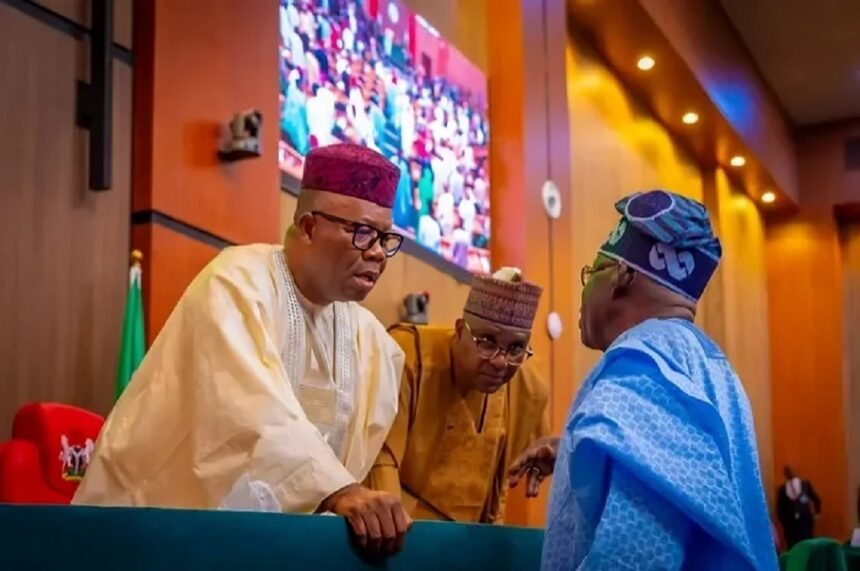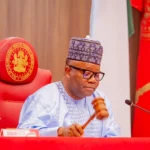…says Legislature focused on pro-Nigerian Legislation
Senate President Godswill Akpabio has said that lawmakers were elected to work collaboratively with the Executive to advance national development—not to engage in confrontation.
According to a statement from Bayo Onanuga Special Adviser to the President (Information and Strategy), Akpabio made this assertion in a forthcoming feature documentary marking the second anniversary of President Bola Tinubu’s administration.
He stressed that the primary responsibility of the National Assembly is to support governance through constructive legislation rather than conflict.
“When elected to the National Assembly – whether in the Senate or House of Representatives – your constituents don’t hand you boxing gloves.
“It’s not a boxing match. You’re expected to work across party lines in the national interest,” Akpabio said.
The Senate President described the current relationship between the National Assembly and the Executive as “cordial and productive,” noting that a shared vision has underpinned major policy moves over the past two years.
“If all your energy is spent fighting the Executive, who then works for Nigeria?” he asked.
ALSO READ: NANS condemns killing of secondary school student in Oyo
He also pointed out the uniqueness of the Tinubu administration, with a President, First Lady, and Vice President who are all former senators—making for smoother institutional synergy.
As part of ongoing legislative priorities, Akpabio disclosed that the National Assembly is drafting a bill to compel government ministries, departments, and agencies (MDAs) to purchase locally assembled vehicles rather than imports.
“We’re working on a law to prioritise Nigerian-made vehicles in government procurement. We’re losing billions of dollars annually importing products that can be made right here,” he said.
Akpabio lamented the decline of Nigeria’s once-thriving manufacturing and agricultural industries, including textiles, cotton, groundnut, and palm oil production.
“Over 50 textile companies have folded. Our cotton and palm oil sectors have collapsed.
“Meanwhile, countries like Malaysia, who took palm oil from us, have built global economies with it,” he said.
He praised President Tinubu’s “Nigeria First” policy as a timely initiative that deserves legislative support.
He revealed that the National Assembly is working closely with the Raw Materials Research and Development Council to pass laws that would compel local production of goods where possible.
“We’re working on legislation that ensures anything that can be made in Nigeria must be made in Nigeria. With over 200 million people, we must bring industries back to serve our population,” Akpabio stated.
He encouraged greater investment in local entrepreneurship, noting that even small ventures like vinegar or bread production could thrive in Nigeria’s massive consumer market.
“If you package vinegar well, it’ll sell. If you bake bread, you can become a millionaire,” he said, emphasising the economic potential of local industry.
Responding to claims that the National Assembly has become a rubber stamp for the Executive, Akpabio said such criticisms are unfounded.
He pointed out that the legislature has, at times, rejected presidential nominees – demonstrating its independence.
“People forget that we’ve made tough calls, including rejecting some of the President’s nominees. We don’t pass everything without scrutiny,” he noted.
According to him, the legislature’s role is not to obstruct but to ensure executive proposals serve the broader public interest.
“Our duty is to scrutinise, amend where necessary, and ensure every policy benefits the Nigerian people. We help the President to deliver,” he added.
Akpabio assured Nigerians that the 10th National Assembly remains committed to passing laws that uplift citizens and support the administration’s reform agenda.
“This government isn’t about theory – it’s about action. And we’re focused on laws that put people first,” he said.
He cited key legislative accomplishments so far, including the Student Loan Act (NELFUND), tax reforms, and the new Minimum Wage Bill.
“In two years, we’ve achieved a lot. But more is coming. Expect more laws that reduce hardship, expand the economy, and empower young Nigerians,” he promised.
ALSO READ TOP STORIES FROM NIGERIAN TRIBUNE
WATCH TOP VIDEOS FROM NIGERIAN TRIBUNE TV
- Let’s Talk About SELF-AWARENESS
- Is Your Confidence Mistaken for Pride? Let’s talk about it
- Is Etiquette About Perfection…Or Just Not Being Rude?
- Top Psychologist Reveal 3 Signs You’re Struggling With Imposter Syndrome
- Do You Pick Up Work-Related Calls at Midnight or Never? Let’s Talk About Boundaries







